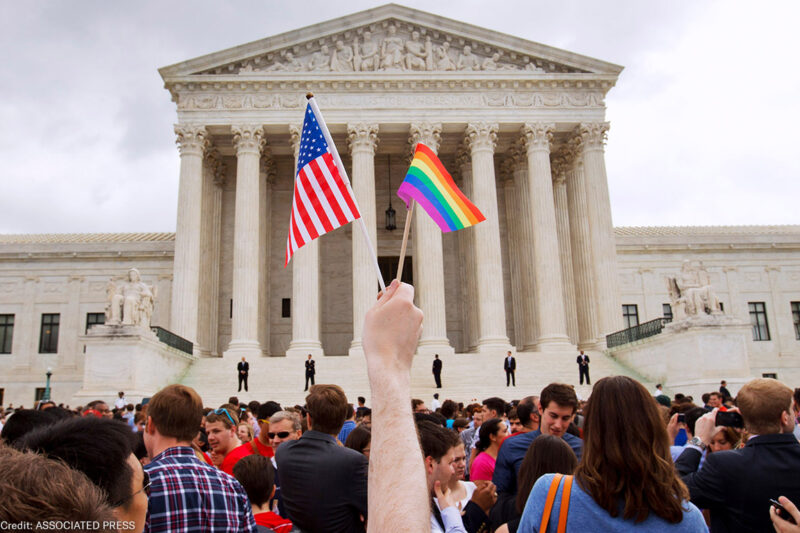
It’s been half a century since the began on June 28, 1969, the reason we celebrate Pride each June. But there’s another fitting date to commemorate this month, and it falls just two days before the 50th anniversary of Stonewall.
June 26 marks the anniversary of the Supreme Court’s landmark decision in 2003 striking down state laws that criminalized same-sex intimacy. The court’s opinion in Lawrence v. Texas did much more than decriminalize being LGBTQ; it was the first step toward recognizing the equal dignity of same-sex relationships under law.
What’s more, June 26 isn’t the anniversary of just one blockbuster Supreme Court opinion advancing LGBTQ rights. It’s also the anniversary of two others. Ten years to the day after its decision in Lawrence, the court struck down the Defense of Marriage Act, which consigned the marriages of same-sex couples to second-class status. Exactly two years later, the court held that same-sex couples have the freedom to marry.
While it’s fitting that the anniversaries of these court decisions fall during Pride month, it isn’t a coincidence. The Supreme Court’s yearly term ends in June, and decisions in the most high-profile cases typically aren’t announced until the final month, giving the justices until the very last minute to put the finishing touches on their opinions. The landmark 1994 case Farmer v. Brennan, in which the court concluded that prison officials could not allow a transgender woman to be raped in prison, was also decided in June, though not on June 26. Still, that three key decisions were announced on the exact same day in June feels significant.
This June 26, however, brings not the end, but the opening salvo in the next major LGBTQ rights issue before the court. Today, LGBTQ employees filed their opening briefs in three cases that will determine whether we are protected from discrimination on the job.
The cases involve three workers who were fired because of who they are. Aimee Stephens, a funeral director in Michigan represented by the ACLU, was fired for being transgender. Donald Zarda, a skydiving instructor in New York represented by the ACLU as co-counsel with NY lawyer Greg Antollino and the Stanford Law School Supreme Court Litigation Clinic, was fired for being gay, as was Gerald Bostock, a child welfare services coordinator in Georgia.
That’s illegal under prevailing interpretations of federal law, but the court could reverse decades of progress and announce that it is perfectly legal to fire someone for being LGBTQ. That would be shocking to most people in this country. Yet the fact that the court agreed to hear the cases raises that alarming possibility, particularly now that Justice Kennedy, long seen as the court’s champion of LGBTQ rights, has been replaced by Justice Kavanaugh.
There are reasons for LGBTQ people to stay optimistic, however.
For starters, there’s the text of the statute itself. Title VII of the Civil Rights Act of 1964 prohibits job discrimination “because of sex.” Firing someone for being a man who dates other men, or for being a woman who was assigned the sex male at birth, is literally discrimination “because of sex.”
Then there’s the Supreme Court’s robust history of interpreting Title VII to protect workers from sex discrimination in myriad forms. The court’s very first Title VII case involved Ida Phillips, who was disqualified from applying for a job because she was a mother with young children. The problem was not that Phillips was a woman; the employer hired women in droves. It was the kind of woman she was: one who, the employer assumed, would be too busy with her preschoolers to do the job.
That is precisely the kind of group-based assumption that Title VII was intended to stamp out. Just as Ida Phillips was entitled to the opportunity to prove that she could do the job, so too LGBTQ people must be free to compete based on their own merit, not assumptions about gender roles.
Finally, there’s the fact that the current crop of cases, unlike the June 26 trio of years past, involves not constitutional rights, but the words of a statute. That means the justices don’t have to agree that the marriage question was rightly decided—or that they are bound to follow it—to rule in favor of the LGBTQ employees here. That will be key to the path to victory, because the workers will need the vote of at least one justice who opposed marriage equality in 2015 or who has since been appointed by President Trump.
We won’t find out whether the court will affirm workplace protections for LGBTQ people this Pride month, however. For that, we’ll have to wait until next year—perhaps until June 26.
In the meantime, employers don’t need to wait to do the . And all of us should call on the Senate to pass the —which will provide express protection against discrimination because a person is lesbian, gay, bisexual, or transgender—right now. This Pride month, it’s never been more important to make our voices heard.

